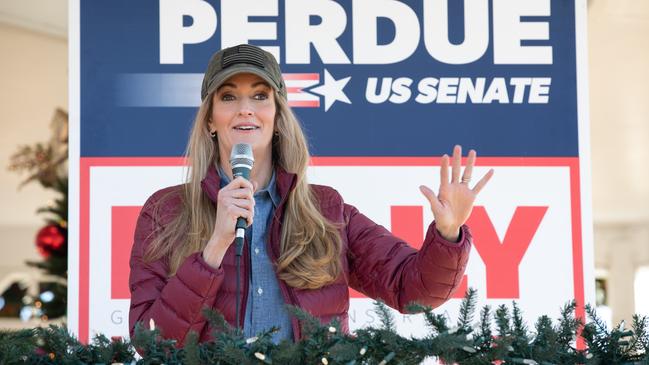Georgia military families who backed Biden could help determine Senate control
Joe Biden’s narrow victory in Georgia last month was driven in part by shifts in nine counties with strong ties to the military.

President-elect Joe Biden’s narrow victory in Georgia last month was driven in part by shifts toward the Democratic ticket in a collection of nine counties with strong ties to the military.
As a group, the military counties backed President Donald Trump. However, his victory margin was 7.8 percentage points less than in 2016, a greater movement than the 5.3-point swing toward Mr Biden statewide.
And while voter turnout grew by less than 21 per cent across Georgia, the number of votes cast in military counties rose by nearly 26 per cent.
Now, Mr Trump’s veto of the annual defence policy bill is adding new complications to GOP voter turnout efforts ahead of the January 5 Georgia run-off elections that will determine control of the US Senate. Mr Trump said he rejected the bill due to provisions that would remove Confederate names of military bases, limit his ability to withdraw troops abroad and didn’t remove legal protections for internet platforms he says squelch conservative voices.
The $US740.5bn passed the House and Senate with bipartisan majorities, including support from senators. David Perdue and Kelly Loeffler, the two Georgia Republicans defending their seats in the runoffs.
The two senators must now decide whether to support a president who could help boost Republican turnout in the runoffs or back a veto override of the bill. The legislation authorises $168 million in military construction projects in Georgia, funds for educating military children and enhanced hazard pay and bonuses for certain military personnel, among other things.
Neither senator has disclosed a decision on the matter, which the Senate is likely to take up this week after more than 100 House Republicans joined Democrats to pass the veto override on Monday. Democrats Jon Ossoff, who is challenging Senator Perdue, and Raphael Warnock, who is facing Senator Loeffler, have both said they would vote to override Mr Trump’s veto.
Brian Robinson, a Republican political consultant in the state, said either decision on the veto override “poses potential injury” to the two senators’ standing with voters.
“To take the President’s side on this is to say, ‘We were wrong before when we voted for this legislation’ … And then going the other direction, you run the risk of President Trump tweeting about you,” Mr Robinson said.
Military and veterans’ affairs are always important in a state with the sixth-largest contingent of active duty, reserve and civilian defence workers. But the improved Democrat performance in the presidential election has made Georgia’s military communities an especially important part of each party’s calculations in the Senate run-off elections.
A large survey of 2020 presidential voters, called AP VoteCast, found that Mr Trump led Mr Biden by 13 points nationally among households that included a veteran. But in Georgia, where one-third of households include veterans, his lead was a much narrower 5 points. Among Georgia voters in veterans’ households, he drew 52 per cent to Mr Biden’s 47 per cent.
It is unclear that any shift in military communities will be durable, or how it will influence voter choices in the runoffs. Many military communities include suburban voters who opposed Mr Trump’s re-election but supported Republicans for other offices. The next GOP presidential nominee could help the party capitalise on its longtime advantage as the party seen as best on national security.
Vice President Mike Pence recently visited Columbus, near the Army’s Fort Benning, and earlier this month stopped in Augusta, home to Fort Gordon, where he talked up Senator Loeffler’s membership on the Senate committee on veterans affairs and Senator Perdue’s defence-budget work on the Armed Services Committee.
The Perdue campaign is highlighting endorsements from military veterans, including Arnold Punaro, a retired Marine Corps major general who worked for former senator Sam Nunn, a Georgia Democrat, for 24 years.
The combined Democrat campaigns of Mr Ossoff and Mr Warnock have run phone banks aimed at military families. This month, Mr Biden, who touted his late son Beau’s military service in Iraq during the general election, closed an Atlanta rally with his standard lines: “May God bless you. May God protect our troops.”
VoteVets.org, a liberal group, is among the national organisations supporting the two Democrats. One of its broadcast ads features retired major general Paul Eaton, a former commander at Fort Benning, who doesn’t mention any Democrat candidate but urges Georgians to vote against Senator Perdue, arguing, among other things, that his vote to repeal the Affordable Care Act would hurt veterans.
Political analysts and local Democratic officials say that the growth of several military facilities, as well as the Pentagon’s decision to consolidate some hi-tech functions in Georgia, has changed the political complexion of some military counties.
Mr Trump’s winning margin, for example, fell by 11 percentage points from 2016 in Columbia County, home to more than half the workers at the Army’s Fort Gordon. That facility has drawn more workers with hi-tech backgrounds and college degrees as the army consolidated digital-warfare operations there. The new Army Cyber Command and other functions have added 9000 workers to the base in the past eight years, according to the Fort Gordon Alliance, a civic group.
Mr Robinson, the GOP consultant, said Fort Gordon is one reason Columbia County is drawing more college-educated voters, a group that nationally has leaned increasingly Democrat. “I think what you’re seeing there is reflected in other highly educated communities around the state, a defection from the Republican Party,” he said.
Fort Gordon is also changing the racial complexion of the area, said Ceretta Smith, an army veteran and official in the Columbia County Democratic Party. The military “is probably the most diverse organisation that you can work for. And so that diversity is changing the community,” she said.
Census data show that Columbia County has diversified a bit faster than the state since 2010.
To assess the vote in military communities, The Wall Street Journal relied on the American Communities Project at George Washington University, which groups the nation’s 3100 counties by their demographic, economic and other characteristics. Military counties are those with large shares of active duty personnel and veterans located in and around military installations.
Nationally, Mr Trump won the 89 military counties with 54.9 per cent of the vote, a slight decline from 2016, while Mr Biden drew 43 per cent, an improvement of nearly 5 points from Hillary Clinton. That combined 5.4-point swing toward the Democratic Party was the second-largest movement of any of the 15 county types as defined by the American Communities Project, trailing only the nation’s exurbs, which moved by 5.9 points toward the Democrats.
The movement reflects more than the political choices of active duty service members. Military counties are also home to civilians who work at military installations, as well as veterans and the many private businesses that rely on base activity.
Georgia’s nine military counties accounted for 5 per cent of the presidential vote in the state this year. In seven of these counties, voting margins showed Democrat gains from 2016. In addition to Columbia County, which moved 11 points in net margin toward the Democratic nominee, Democratic margins improved by 9 points in Houston County, home to Robins Air Force Base, and by nearly 8 points in Bryan County, where the Army’s Fort Stewart is located.
The only military county in which Mr Trump made meaningful gains was Chattahoochee County, near Fort Benning, where his margin improved by 2.2 percentage points.
In Columbia County, Republicans say that Democratic gains in the presidential election were tied to the increase in no-excuse absentee voting. “It wasn’t an anti-Trump vote in any way,” said Debbie McCord, chairwoman of the county Republican Party.
The Wall Street Journal


